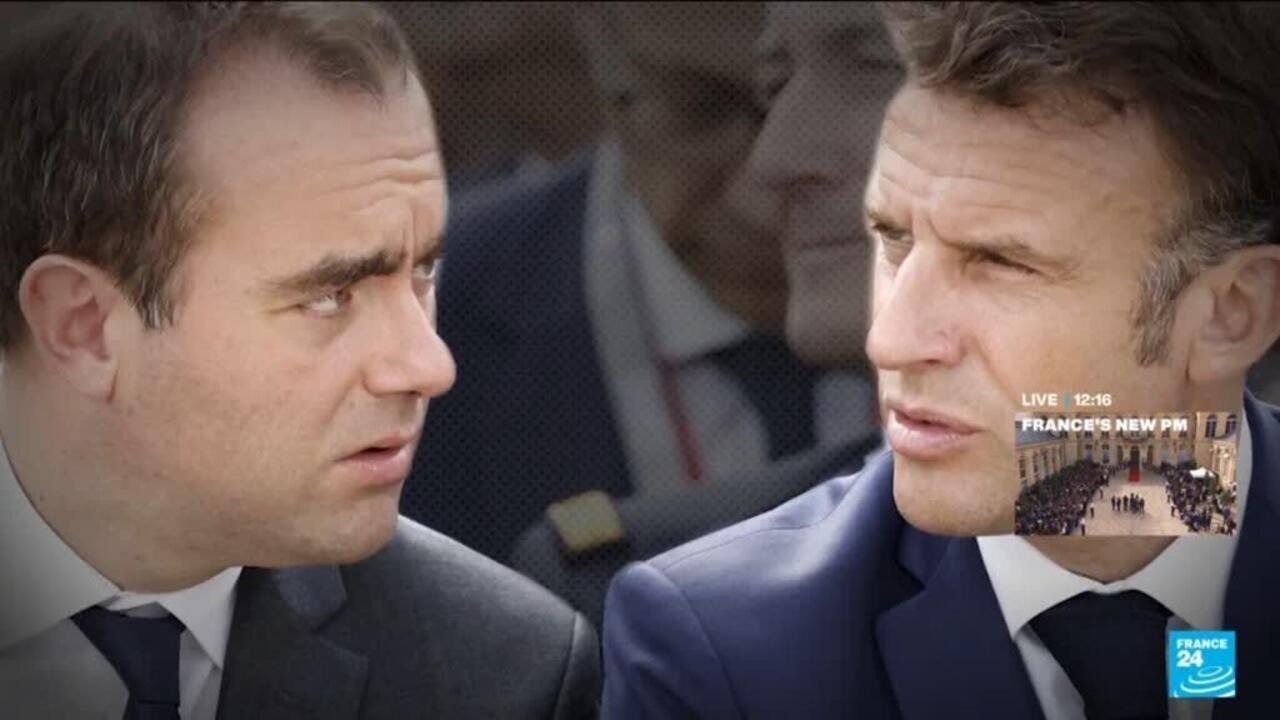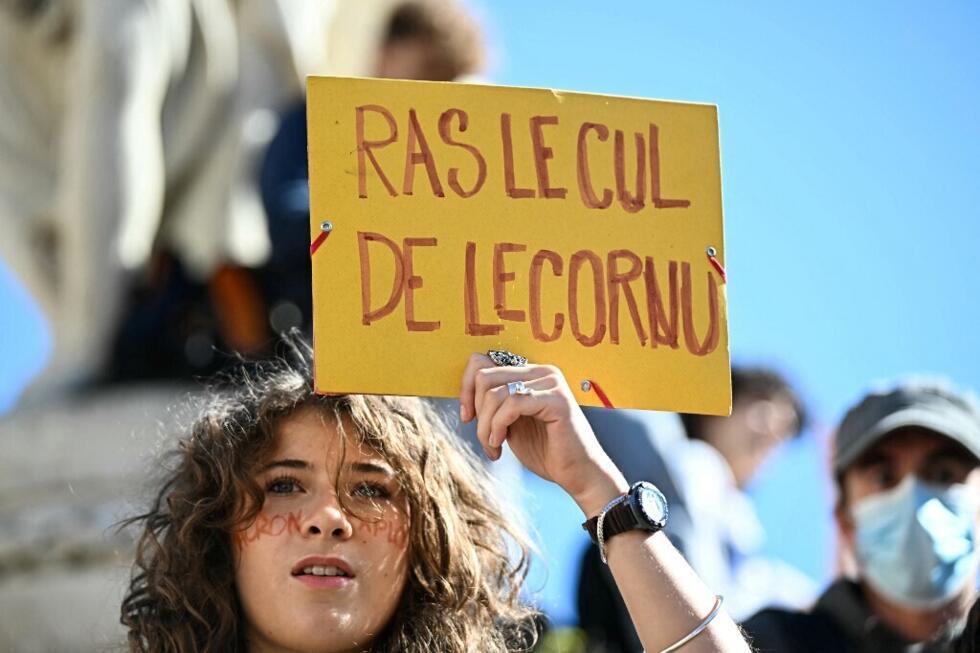France’s new Prime Minister Sébastien Lecornu on Wednesday promised a “profound break” with the past as he took over from François Bayrou, who resigned after losing a confidence vote in parliament.
Speaking at a handover ceremony, Lecornu pledged to find “more creative” ways to work with opposition parties as he assembles his cabinet in a bid to end France’s grinding political crisis. “We will get there,” he said.
Read moreLive: New French PM Lecornu vows ‘break’ with past as ‘Block Everything’ protests disrupt services
The 39-year-old is Macron's fifth prime minister in less than two years – a measure of the turbulence that has gripped French politics since last year’s snap elections left parliament deeply fractured. The president hopes his protégé can restore stability and push through a crucial 2026 budget aimed at cutting debt, despite protests across the country and entrenched opposition from both left and right.
“His mission will be to defend our independence and strength, serve the French people and ensure institutional stability for national unity,” the Élysée said in a statement.
To display this content from YouTube, you must enable advertisement tracking and audience measurement.
One of your browser extensions seems to be blocking the video player from loading. To watch this content, you may need to disable it on this site.

02:25
'A loyal soldier'
Lecornu has kept a low profile during his three years as defence minister, avoiding the media spotlight. Within a year of taking office, he secured lawmakers' backing for a massive hike in military spending without resorting to Article 49.3 – the constitutional tool that lets governments bypass a parliamentary vote – a feat that earned him Macron’s trust.
"He is a loyal soldier who doesn’t have too much charisma or presidential potential," one adviser told AFP, noting one of his greatest assets: unlike other ministers, he is not considered "présidentiable", "electable as president". Macron, weakened and unpopular, values Lecornu precisely because he poses no threat to his authority.
Originally tipped for the premiership in December 2024, Lecornu was sidelined when veteran centrist François Bayrou convinced Macron that he was better suited to steady the ship. Bayrou lasted just nine months before being toppled by parliament on Monday, clearing the way for Lecornu’s rise.
Political prodigy
The son of an aircraft technician and a medical secretary, Lecornu grew up in the Normandy town of Vernon, northwest of Paris. He entered politics as a teenager, working as a parliamentary assistant to Bruno Le Maire at just 19. By 22, he was the youngest-ever ministerial adviser, handling European affairs under then-president Nicolas Sarkozy.
His climb was quick: mayor of Vernon at 27, president of the Eure regional département at 29, and a junior minister in Macron’s first government in 2017, aged just 31. He later handled portfolios in ecology and overseas territories before taking over defence in 2022.
Unlike many French leaders, Lecornu did not come through the so-called "grandes écoles", top professional schools, that have long trained French elites. Educated in private Catholic schools, he studied law before beginning – but never completing – a master’s degree in public law at Panthéon-Assas University in Paris. Allies say he has stayed connected to his local roots and "looks more serious than his age" in a political world still dominated by older men.
A mixed record
Lecornu’s career has not been without missteps. As overseas minister, he oversaw 2021's fraught referendum in New Caledonia that was boycotted by independence groups, undermining the legitimacy of the vote. He has also been powerless to prevent his home region of Eure from swinging heavily to Marine Le Pen’s far-right National Rally party in the 2022 presidential elections as well as in the 2024 snap legislative elections.
As defence minister, however, he has become a broadly respected figure, speaking publicly on sensitive issues from nuclear strategy to the Middle East. He managed to secure industrial backing for arms deliveries to Ukraine, even from reluctant players, and pushed France to invest in military autonomy within Europe.
African policy was less of a success: under his watch, French troops were expelled from Burkina Faso, Niger and Chad, marking the collapse of Paris’s military presence in the Sahel.
Read moreFrance ends military presence in Sahel region with handover of last base in Chad
Friends and foes
Lecornu is close to Justice Minister Gérald Darmanin, another Macron ally who defected from the right. He has also cultivated ties across the political spectrum, earning a reputation as "the king of political flirting".
"He talks to everyone – from (the hard-left) France Unbowed party to the RN," François Cormier-Bouligeon, a lawmaker from Macron's Renaissance party, told Le Monde. "He’s the opposite of a sectarian."
However, the new prime minister also enters office under fire for past remarks. Green Party leader Marine Tondelier condemned him as "homophobic", citing past comments he made to local media opposing same-sex marriage and adoption rights.
At the time, in 2012, Lecornu said he found "gay communitarianism" just as frustrating as homophobia, insisting marriage was "the foundation for building a family between a man and a woman".
He later softened his stance, telling France Info in 2019 he had "come a long way", especially on medically assisted reproduction.
His reported dinners with Le Pen and her protégé Jordan Bardella have also fuelled suspicion on the left, where many accuse Macron of pandering to the far right. Socialist Party members, who were eyeing the PM's job, reacted angrily to his appointment, calling it a "provocation" and warning that Lecornu’s government would only deepen "failure and chaos".
National Rally leader Bardella, however, struck a cautious tone, saying he would judge Lecornu "on his actions and policies". That reprieve could help the new prime minister survive his first weeks in office.
A daunting task
Lecornu is expected to unveil his cabinet in the coming days, but few expect major changes. The real test will come with the budget, which must be passed by the end of the year to avoid financial penalties from Brussels.
Watch moreFrance's new PM tasked with forging consensus on 2026 budget
In a measure of the challenges that lie ahead, his first day in office coincides with nationwide "Block Everything" protests against austerity. The "stability" Macron has tasked Lecornu with delivering may already be out of reach.

Lecornu’s rapid climb through the ranks and his unshakeable loyalty to the president have brought him to Matignon, the official residence of French prime ministers. But whether he can survive France’s political storm remains an open question.











 English (US) ·
English (US) ·